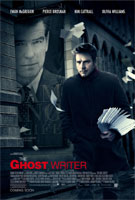The Ghost Writer is a very serious film about and for adults, and for that we should commend it-- we don't get too many of those these days. But while Roman Polanski's film occasionally plays well with dramatic tension and right well by its skilled lead actors, more often it feels limp and overblown, a take on modern political intrigue from a guy who's been in exile for decades. He clearly knows how it all ought to work, but doesn't quite have the right language any more.
It took guts for Polanski to set the film on Cape Cod, in a country he is not allowed to visit. It took even bigger guts for Robert Harris to write the original book four years ago, when the Tony Blair/George Bush-supported war that inspires the film was at its violent peak and it seemed unlikely that either would ever be punished for it. The Blair stand-in at the center of this film is former Prime Minister Adam Lang (Pierce Brosnan, blank but appealing), a pretty boy politician busy writing his memoirs when news breaks that he assisted the United States in torturing terror suspects. This is all happening inconveniently right after Lang's previous ghostwriter mysteriously drowned, and the day that the new, unnamed ghost (Ewan McGregor) arrives, the Lang household is already in turmoil.
Holed up at a stunning modernist home by the beach, Lang and his staff (led by an icy Kim Cattrall whose accent wavers wildly) try to play damage control, all the while the ghost wades through his predecessor's shoddy manuscript and Lang's wife (Olivia Williams) sulks in every corner. Thanks to some leftover clues from the previous ghostwriter and an apparent disinterest in keeping his job, the ghost starts investigating discrepancies in Lang's official life story, while also wondering if that other guy's drowning was so accidental.
The ghost's investigation leads him to a crusty old-timer (Eli Wallach) and a marvelously tense and foreboding conversation with Tom Willkinson, all of which works; the problem is that it takes forever for it all to happen. It's at least an hour into the movie before we have an inkling of what the ghost is actually investigating, and only in the final moments of the film does it connect to the larger scandal Lang is facing. And while the various war crimes are sadly plausible, the ensuing public outrage, or the notion that anyone in the government would try to apologize for it, are somewhat laughable. Adam Lang suffers immensely more than Tony Blair or George W. Bush ever will, and yet, Polanski asks us to accept his crimes as career killers.
The tension that's so well-honed in the early scenes in the house dissipates once the ghost strikes out on the mainland for his investigation, and the third-act revelations and mild action scenes lose all impact by the time they arrive. McGregor is an appealing actor to spend two hours with, but he's no match for all the aimless wandering and staring into space the character is forced to endure. Williams is the most wily and engaging presence in the film, and her scene with McGregor crackle, but her character's motives remain frustratingly murky until they are revealed to be simply preposterous.
It's no means an embarrassment from the man who made Chinatown, and at this point, no one is expecting another Chinatown out of Polanski anyway. But The Ghost Writer is not nearly as good as it could have been, a squandered opportunity both to take on the real-life crimes of the Iraq War and create genuine tension and suspense. By working fleetingly, it only teases you about what might have been.
Your Daily Blend of Entertainment News
Staff Writer at CinemaBlend


